Effect of Experience-based School Learning Gardens Professional Development Program Workshop on Teachers’ Attitudes towards Sustainability Education
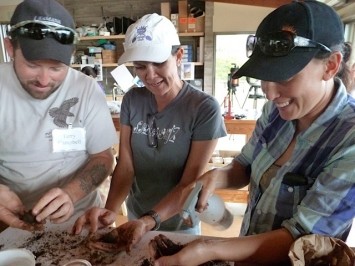
PDF: RayMingBarrettJSESpring2013
Abstract: We are faced with a multitude of environmental challenges today, including sustainable food, water, land, and energy resources. As we strive to understand and address these resource issues, we become keenly aware that there are neither quick fixes nor short-term solutions. Consequently, these resource issues will be handed down from this generation to the next—and to the next—for progressive resolution. Therefore, our students need to have an education grounded in STEM (science, technology, engineering, and mathematics) that will prepare them to become the systems thinkers, critical analyzers, and creative problems solvers that living sustainably on this planet demands. In order to benefit from such an education, our students require teachers who are not only well-trained in STEM concepts and skills but also understand how to create authentic, standards- and experienced-based learning activities for their students in meaningful educational settings. To address this requirement, a year-long, experience-based School Learning Gardens Professional Development Program was created for teachers, implemented by the The Kohala Center’s Hawaiʻi Island School Garden Network on the Big Island of Hawaiʻi, and funded through a USDA/SPECA “Ag in the Classroom K-12” grant. This study was conducted with the 29 classroom and school learning garden teachers who participated in the week-long teacher training workshop component of the program. The study examined teachers’ attitudes toward sustainability education before and after the workshop. Teachers’ attitudes were measured using the Teachers’ Attitudes Related to Sustainability Education survey. Findings revealed that there was a statistically significant increase in teachers’ overall attitudes toward sustainability education, as well as their attitudes related to productivity and comfort within sustainability education.
These findings were viewed as an essential first step in assuring that teachers were prepared and willing to provide students with meaningful, experience-based school learning garden activities that hold promise for an environmentally-sound and resource-sustainable future for generations to come.
Keywords: learning gardens, professional development, sustainability education, teachers’ attitudes
Education is recognized as having an important role in creating solutions to the pressing environmental problems of our times (Nolet, 2007; Orr, 1992, 1994). Organizations, such as UNESCO-UNEP (1990), have identified teacher education as the key priority to improving the effectiveness of sustainability education—an education that builds community capacity to shape a future that is more sustainable in the environmental, social, political, and economic realms (Kennelly, Taylor, & Serow, 2012). However, educating teachers about issues of environmental stewardship and related sustainability concepts can be challenging, as sustainability education is serious work which demands holistic and interdisciplinary teaching and learning (Stevenson, 2007). Challenges also include the pre-existing conditions that hold un-sustainability in place (Kemmis and Mutton, 2012), a lack of knowledge and understanding in the field of science (Cutter-Mackenzie and Smith, 2003), and a lack of adopting a culture of sustainability (McFarlane and Ogazon, 2011).
Teachers’ Attitudes toward Sustainability Education in the Literature
Three studies that examined teachers’ attitudes toward environmental sustainability issues were conducted in Nigeria (Kalu, Uwatt, & Asim, 2005), Greece (Spiropoulou, Antonakaki, Kontaxaki, & Bopuras, 2007), and Australia (Kennelly, Taylor, & Serow, 2012). All three studies indicated that while teachers’ attitude towards teaching sustainability education was significantly positive, they lacked knowledge in sustainability-related topics, which, ultimately, undermined their confidence to teach such topics.
In Turkey, researchers worked with 2,067 primary school preservice teachers, measuring their attitudes towards the environment, as well as how gender and grade levels affected their attitudes. The study revealed that Turkish primary school preservice teachers had positive attitudes toward the environment. Findings also revealed that preservice teachers had (1) a moderate awareness of environmental problems, (2) a high propensity toward environmental solutions, (3) a high awareness of individual responsibility, (4) a caring environmental attitude through changing their lifestyles, and (5) a moderate awareness of national environmental problems (Ozsoy, Ozsoy, & Kuruyer, 2011).
Boon (2011) conducted a study with 97 first-year preservice teachers in Australia. Study findings revealed that participants (1) endorsed the value and instrumentality of education for environmental sustainability, (2) had confidence in being able to include education about sustainability in their teaching, and (3) intended to behave in a sustainable manner.
As of this writing, there have been no studies conducted and published that measure United States preservice teachers’ attitudes toward sustainability education. Nor are there studies that measure inservice teachers’ attitudes toward sustainability education. Hence, this study is offered in an attempt to fill the latter gap in the field of experience-based sustainability education.
School Learning Gardens for Sustainability Education Background
Historically, school learning gardens have been around for quite some time—since the early 1800s in Europe and since the late 1800s in the United States. In 1916, through school gardens, “. . . over one million students contributed to the production of food during the war effort” (Subramaniam, 2002, p. 3). Over time, the school garden movement weakened as playgrounds and athletic fields came into vogue and technology grasped center stage. However, there is resurgence in the use of school learning gardens across the country to enhance academic instruction, especially in the STEM subjects, with marked success. Recent research studies revealed that participation in school learning gardens positively impacted both student attitudes toward school and student learning (Bell, 2001; Waliczek, Longa, & Zajicek, 2003), as well as increased students’ overall grades in science and mathematics (Murphy & Schweers, 2003).
Research also revealed that there are barriers to implementing school learning gardens. These barriers include time, teacher training, and teaching materials linked to standards (Graham, Beall, Lussier, McLaughlin, & Zidenberg-Cherr, 2005). In order to address the barriers posed, the School Learning Gardens Professional Development Program was created.
Experienced-based School Learning Gardens Professional Development Program Workshop
A year-long, experience-based School Learning Gardens Professional Development Program was designed and developed for Hawaiʻi classroom and school learning garden teachers under a USDA/SPECA “Ag in the Classroom K-12” grant awarded to The Kohala Center’s Hawaiʻi Island School Garden Network. The program was built upon practicing and connecting the following nine ideas.
- Creating Place-based and Experiential Learning Experiences for Students
- Incorporating the Principles of Sustainability
- Developing Whole Systems Thinking
- Discovering Science, Technology, Mathematics, and Engineering (STEM) Concepts in the School Learning Garden
- Encouraging Nutrition: Seed to Table
- Creating Sustainable Programs and Community Partnerships
- Cultivating Best Practices in Organic Gardening
- Constructing a Teacher Toolbox for Working with Children in the Outdoor Classroom
- Linking School Learning Gardens to Core Curriculum through Developing Lesson Plans
The first phase of the experience-based School Learning Gardens Professional Development Program included a week-long teacher training workshop, which was the focus of this study. The teacher training workshop began on a Sunday evening and concluded the following Saturday afternoon during June of 2012. The workshop took place in Waimea (Kamuela), Hawaiʻi on the Hawaiʻi Preparatory Academy campus, as well as at the Mālaʻaí Culinary Garden on the outskirts of the Waimea Middle School campus. A brief outline of the workshop contents is provided below.
Sunday: Opening Night Dinner and Talk: A Sense of Place through Hawaiian Cultural Ways of Knowing
Monday: Cultivating Our Sense of Place in the Living World
Tuesday: Nurturing Interconnectedness: The Living Soil—Biology, Chemistry, and Culture
Wednesday: Cultivating Hawaiian Agricultural Knowledge: Moʻolelo, History, and Culinary Practices
Thursday: Integrating Science in the Garden
Friday: Integrating Learning Gardens, Pedagogy, and Curriculum
Saturday: Integrating Learning Gardens, Pedagogy, and Curriculum
The experience-based School Learning Gardens Professional Development Program also included guiding principles based upon Hawaiian Cultural Values as follows:
- Ma ka hana ka ‘ike
Interpretation: By doing one learns. This includes experiential learning for adult educators. Research into teacher learners indicates that they learn from their own practice, as well as from their interaction with other teachers (Bransford, Brown, & Cocking, 2000; Wilson, 2011).
- E malama ‘oe i ka ‘āina, e malama ka ‘āina ia ‘oe
Interpretation: Take care of the land and the land will take care of you.
- Pa‘ahana
Interpretation: To be hard working and industrious. These are “Attitudes of Aloha” and include the following.
- Lōkahi
Interpretation: Begin with a positive mindset and intention.
- Mālama kuleana
Interpretation: Keep area organized and clean.
- ‘Imi na‘auao
Interpretation: Stay focused on the task at hand.
- Mālama kuleana
Interpretation: Be meticulous. End with a clean working space.
- ‘Imi na‘auao
Interpretation: Take your time.
- Kōkua
Interpretation: Keep busy. If your job is done, help others.
- Mahalo
Interpretation: End in self-realization and gratitude of work well done.
Purpose
The purpose of this study was to determine whether or not teachers’ attitudes toward sustainability education would improve over the course of a week-long, experience-based professional development workshop that focused on one aspect of sustainability education—school learning gardens.
Research Questions
The research questions posed prior to the start of this study included one overarching question (Question 1), followed by three sub-questions (Questions 2, 3, and 4), as follows:
- Question 1: Will teachers’ overall attitudes toward sustainability education improve after participating in a week-long experience-based professional development teacher training workshop?
- Question 2: Will teachers’ attitudes related to the importance of sustainability education improve after participating in a week-long experience-based professional development teacher training workshop?
- Question 3: Will teachers’ attitudes related to their productivity within sustainability education improve after participating in a week-long experience-based professional development teacher training workshop?
- Question 4: Will teachers’ attitudes related to their comfort with sustainability education improve after participating in a week-long experience-based professional development teacher training workshop?
Special Note: Based upon the research questions, four research hypotheses were formulated. The research hypotheses may be viewed in Appendix A. For statistical testing purposes, four null hypotheses were developed. The null hypotheses may be viewed in Appendix B.
Method
Research Design
The research design employed for this study was a one-group pretest posttest design.
Research Instrumentation and Administration
One instrument was developed to measure teachers’ attitudes toward sustainability education. The instrument, Teachers’ Attitudes Related to Sustainability Education, was a survey (see Appendix C for Measurement Instrument: Teacher’s Attitudes Related to Sustainability Education). The survey consisted of a 7-step semantic differential with 15 adjective pairs covering three sub-profiles—(1) an importance sub-profile, (2) a productivity sub-profile, and (3) a comfort sub-profile (see Appendix D for Table D1: Adjective Pairs for Three Sub-Profiles Measured in the Sustainability Education Survey). This survey was adapted from a survey originally developed by the Albany Public School System to measure teachers’ attitudes toward computer-assisted instruction (Stoneberg, 1985), later redeveloped by Rader (1996) to measure teachers’ attitudes toward curriculum alignment, and most recently redeveloped by Ray, Kalvaitis, Wheeler, and Hirtle (2011) to measure teachers’ attitudes toward social media. The modification made to this instrument was the writing prompt only. The 7-step semantic differential with 15 adjectives pairs remained the same. The Teachers’ Attitudes Related to Sustainability Education survey was administered prior to the beginning of the experience-based School Learning Gardens Professional Development Program week-long teacher training workshop and at the conclusion of the workshop.
Approval to Conduct Study
Approval to conduct this study with obtained from the Institutional Review Board’s Committee for Human Studies at the University of Hawaiʻi.
Research Participants
Participants in this study were 29 classroom and learning-garden teachers, who lived and taught on the Big Island of Hawaiʻi. The teachers represented 17 different elementary (6), middle (5), high (3), and K-12 (3) public, private, and charter schools, as well as a youth agricultural program (1) on the island.
Procedure
Data was collected from the participants prior to and after the week-long teacher training workshop portion of the experience-based School Learning Gardens Professional Development Program. In order to ensure uniform completion of the surveys, two of the three researchers were present throughout the data collection process. After a brief introduction to the research, the surveys were distributed to participants. It took participants about 10 minutes to complete the surveys during each administration
.
A one-way analysis of variance was performed on the pre- and post-data collected through the Teachers’ Attitudes Related to Sustainability Education survey. The analysis of variance (ANOVA) was selected for statistical hypotheses testing. It was used to determine whether there were any significant changes in teachers’ attitudes related to sustainability education as a result of the week-long workshop training workshop.
Results
Research findings revealed that there were statistically significant gains in the teachers’ overall attitudes toward sustainability education. Further, two of the three sub-profiles—productivity and comfort—revealed statistically significant gains as well. The third sub-profile—importance—did not show statistically significant gains due to a ceiling effect.
The results for the one-way analysis of variance of means for the teachers’ overall attitudes revealed that there was a statistically significant increase in teachers’ overall scores. The mean score increased from 89.7 to 96.3, inferring an increase in overall attitude, as shown in Figure 1.
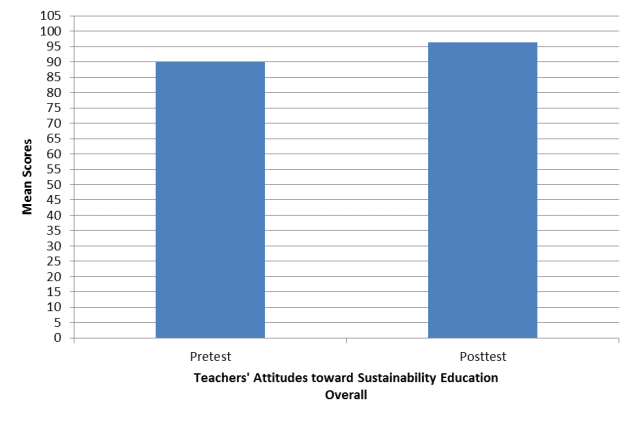
Figure 1. Mean values representing pretest and posttest scores for teachers’ overall attitudes toward sustainability education.
This proved to be statistically significant at a level less than .05, as shown in Table 1.
The results for the one-way analysis of variance of means of teachers’ attitudes for the sub-profile on productivity showed that there was a statistically significant increase in their productivity scores, inferring that their view of productivity had increased. The mean score increased from 30.04 to 32.06, as shown in Figure 2.
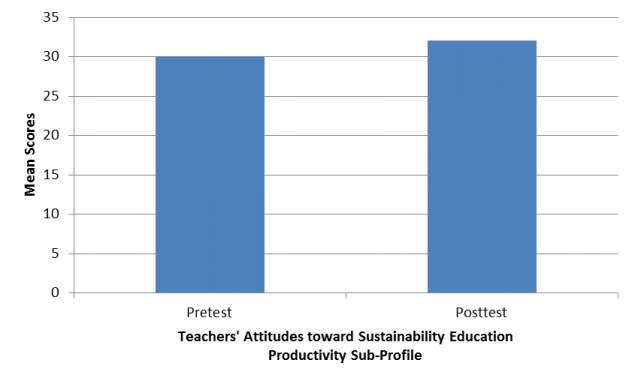
Figure 2. Mean values representing pretest and posttest scores for the productivity sub-profile for teachers’ attitudes toward sustainability education.
This proved to be statistically significant at a .049 level, as shown in the Table 2.
The results for the one-way analysis of variance of means of teachers’ attitudes for the sub-profile on comfort showed that there was a statistically significant increase in their comfort scores, implying that their comfort had increased. The mean score increased from 25.96 to 30.02, as shown in Figure 3.
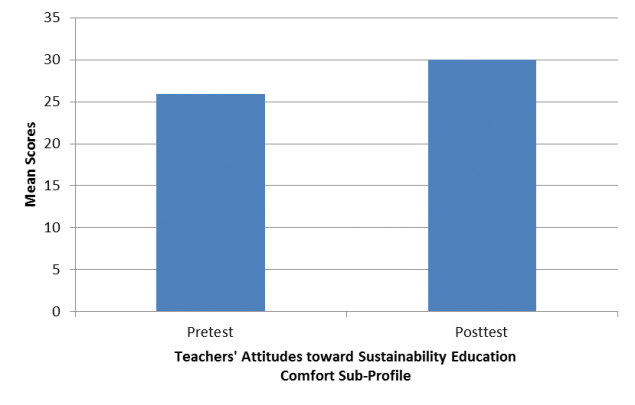
Figure 3. Mean values representing pretest and posttest scores for the comfort sub-profile for teachers’ attitudes toward sustainability education.
This proved to be statistically significant at a level less than .001, as shown in Table 3.
The results for the one-way analysis of variance of means of teachers’ attitudes for the sub-profile related importance did not prove to be statistically significant. The mean score only increased from 33.73 to 34.19, where the maximum number of points possible was 35, as shown in Figure 4.
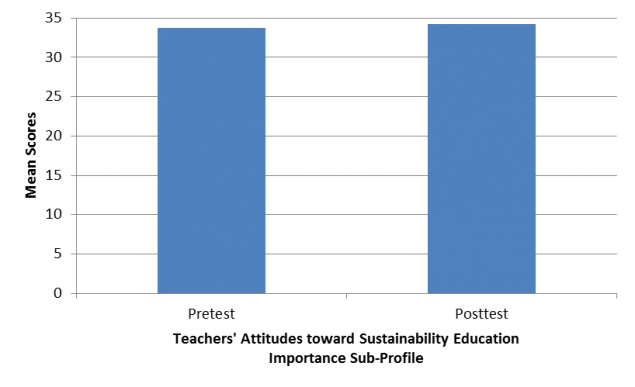
Figure 4. Mean values representing pretest and posttest scores for the importance sub-profile for teachers’ attitude toward sustainability education.
In order to determine why there was no significant increase, the researchers examined the scores and found a ceiling effect. The teachers who participated in the experience-based professional development teacher training workshop already felt that sustainability education was important. After all, they were all involved in working with children in experiential education through learning gardens prior to the start of the workshop and study. Their mean pretest score of 33.73 was very nearly at the upper limit of the instrument range—35.
Discussion
Summary
A one-group pretest posttest design was used to examine teachers’ attitudes toward sustainability education before and after an experience-based School Learning Gardens Professional Development Workshop one-week intensive. The survey instrument, Teachers’ Attitudes Related to Sustainability Education, consisted of a 7-step semantic differential with 15 adjective pairs covering three sub-profiles—(1) an importance profile, (2) a productivity profile, and (3) a comfort profile. It was administered before and after the workshop. A one-way analysis of variance was performed on the pre- and post-data collected through the survey. Findings revealed that there were statistically significant gains in the overall teacher’s attitudes toward sustainability education, as well as statistically significant gains for two of the three sub-profiles—productivity and comfort—as well. The researchers’ analysis of the importance sub-profile, which did not show statistically significant gains, revealed a ceiling effect. In conclusion, the experience-based School Learning Gardens Professional Development Program week-long teacher training workshop had a positive impact on teachers’ attitudes toward sustainability education.
Conclusions
The study findings revealed that a week-long experience-based School Learning Gardens Professional Development Program workshop had a positive impact on teachers’ attitudes toward sustainability education. This is a significant finding, since “if teachers don’t have positive attitudes toward environmental issues, they won’t be able to educate children having desired characteristics” (Ozsoy, Ozsoy, & Kuruyer, 2011, p. 15). The researchers concluded that professional development opportunities, such as the experience-based School Learning Gardens Professional Development Program workshop, have the potential to engender the essential first step in assuring that teachers are prepared and willing to provide students with meaningful, experience-based school learning garden activities that hold promise for an environmentally-sound and resource-sustainable future for generations to come.
However, although it may be surmised from significantly positive attitude gains that teachers are ready and able to embrace sustainability education, such interpretations must be cautioned. Other researchers in countries, such Nigeria, Greece, and Australia, have shown that even though attitudes toward environmental sustainability issues are significantly positive, many teachers lack knowledge in specific sustainability topics, which, in turn, undermines their teaching confidence (Kalu, Uwatt, & Asim, 2005; Spiropoulou, Antonakaki, Kontaxaki, & Bopuras, 2007; Kennelly et al., 2012). It is recommended, therefore, that researchers in the field continue to monitor teachers’ attitudes toward sustainability education while delving deeper into an understanding of the knowledge base, resources, and support systems that are essential for sustainability education success.
Special Note: For more information about the week-long teacher training workshop and the year-long School Learning Gardens Professional Development Program, please visit The Kohala Center website at the following URL: www.kohalacenter.org/teachertraining/about.html.
Acknowledgments: This research was supported by The Kohala Center’s Hawaiʻi Island School Garden Network and a USDA/SPECA “Ag in the Classroom K-12” grant. The researchers would like to thank Betsy Cole, Nancy Redfeather, and Amanda Rieux of The Kohala Center, the Hawaiʻi Island School Garden Network, and the Mālaʻaí Culinary Garden for their support of this research project.
References
Bell, A. (2001). The pedagogical potential of school grounds. In T. Grant & G. Littlejohn (Eds.), Greening School Grounds: Creating Habitats for Learning. Gabriola Island, BC: New Society Publishers.
Boon, H. J. (2011). Beliefs and education for sustainability in rural and regional Australia. Education in Rural Australia, 21(2), 37-54.
Bransford, J. D., Brown, A. L., & Cocking, R. R. (Eds.). (2000). How people learn: Brain, mind, experience, and school. Washington, DC: National Academy Press.
Cutter-Mackenzie, A., & Smith, R. (2003). Ecological literacy: The ‘missing paradigm’ in environmental education (part one). Environmental Education Research, 9(4), 497–524.
Graham, H., Beall, D., Lussier, M., McLaughlin, P., & Zidenberg-Cherr, S. (2005). Use of school gardens in academic instruction. Journal of Nutrition Education and Behavior, 37(3), 147-151.
Kalu, I., Uwatt, L. E., & Asim, A. E. (2005). Nigerian teachers’ attitude toward environmental sustainability issues in the curriculum. Journal of Environmental Systems, 32(3), 249–259.
Kennelly, J., Taylor, N., & Serow, P. (2012). Early career primary teachers and education for sustainability. International Research in Geographical and Environmental Education, 21(2), 139-153.
Kemmis, S. & Mutton, R. (2011). Education for sustainability (EfS): practice and practice architectures. Environmental Education Research, 18(2), 187-207.
McFarlane, D. A. & Ogazon, A. G. (2011). The challenges of sustainability education. Journal of Multidisciplinary Research, 3(3), 81-107.
Murphy, M., & Schweers, E. (2003). Evaluaiton of a food systems-based approach to fostering ecological literacy. Berkley, CA: Center for Ecoliteracy.
Nolet, V. (2007). Preparing sustainability literate teachers. Teachers College Record, 111(2), 409–442.
Orr, D. W. (1992). Ecological literacy: Education and the transition to a postmodern world. Albany, NY: State University of New York.
Orr, D. W. (1994). Earth in mind: On education, environment, and the human prospect. Washington, DC: Island Press.
Ozsoy, S., Ozsoy, G., & Kuruyer, H. G. (2011). Turkish pre-service primary school teachers’ environmental attitudes: Effects of gender and grade level. Asia-Pacific Forum on Science Learning and Teaching, 12(2), Article 5.
Rader, J. (1996). The effect of curriculum alignment between mathematics and computer-assisted mathematics on student performance and attitudes, staff attitudes, and the measurement of alignment. (Unpublished doctoral dissertation). United States International University, San Diego, CA.
Ray, J., Kalvaitis, D., Wheeler, C., & Hirtle, J. (2011). Teachers’ attitudes, behaviors, and opinions related to social media use. Proceedings of the World Conference on E-Learning in Corporate, Government, Healthcare, and Higher Education, 861-866.
Spiropoulou, D., Antonakaki, T., Kontaxaki, S., & Bopuras, S. (2007). Primary teachers’ literacy and attitudes on education for sustainable development. Journal of Science Education and Technology, 16, 443-450.
Stevenson, R. (2007). Schooling and environmental/sustainability education: From discourses of policy and practice to discourses of professional learning. Environmental Education Research, 13(2), 265–285.
Stoneberg, B. (1985). Computer-assisted instruction: A report to the board. Albany: Greater Albany Public School District.
Subramaniam, A. (2002). Garden-based learning in basic education: A historical review. Davis, California: Center for Youth and Development
UNESCO-UNEP. (1990). Environmentally educated teachers: The priority of priorities. Connect, XV(1), 1–3.
Waliczek, T. M., Logan, P., & Zajicek, J. M. (2003). Exploring the impact of outdoor environmental activities on children using a qualitative text data analysis system. HortTechnology, 13, 684–688.
Wilson, S. (2011). Effective STEM teacher preparation, induction, and professional development. White Paper. Michigan State University.
Appendix A
Research Hypotheses
Based upon the research questions, four research hypotheses were formulated as follows:
- Hypothesis 1: Teachers’ overall attitudes toward sustainability education will improve after participating in a week-long experience-based professional development teacher training workshop.
- Hypothesis 2: Teachers’ attitudes related to the importance of sustainability education will improve after participating in a week-long experience-based professional development teacher training workshop.
- Hypothesis 3: Teachers’ attitudes related to their productivity within sustainability education will improve after participating in a week-long experience-based professional development teacher training workshop.
- Hypothesis 4: Teachers’ attitudes related to their comfort with sustainability education will improve after participating in a week-long experience-based professional development teacher training workshop.
Appendix B
Null Hypotheses
For statistical testing purposes, four null hypotheses were developed as follows:
- Null Hypothesis 1: Participation in a week-long experience-based professional development teacher training workshop will have no impact on teachers’ overall attitudes toward sustainability education.
- Null Hypothesis 2: Participation in a week-long experience-based professional development teacher training workshop will have no impact on teachers’ attitudes related to the importance of sustainability education.
- Null Hypothesis 3: Participation in a week-long experience-based professional development teacher training workshop will have no impact on teachers’ attitudes related to their productivity within sustainability education.
- Null Hypothesis 4: Participation in a week-long experience-based professional development teacher training workshop will have no impact on teachers’ attitudes related to their comfort with sustainability education.
Appendix C
Measurement Instrument: Teachers’ Attitudes Related to Sustainability Education
Instructions: Indicate how you feel about sustainability education. Circle the number between each of the pairs of adjectives that best reflects your thinking right now.
|
1. |
essential |
7 . . . 6 . . . 5 . . . 4 . . . 3 . . . 2 . . . 1 | nonessential | |||
|
2. |
familiar |
7 . . . 6 . . . 5 . . . 4 . . . 3 . . . 2 . . . 1 | unknown | |||
|
3. |
useful |
7 . . . 6 . . . 5 . . . 4 . . . 3 . . . 2 . . . 1 | useless | |||
|
4. |
important |
7 . . . 6 . . . 5 . . . 4 . . . 3 . . . 2 . . . 1 | unimportant | |||
|
5. |
easy to use |
7 . . . 6 . . . 5 . . . 4 . . . 3 . . . 2 . . . 1 | frustrating | |||
|
6. |
necessary |
7 . . . 6 . . . 5 . . . 4 . . . 3 . . . 2 . . . 1 | unnecessary | |||
|
7. |
productive |
7 . . . 6 . . . 5 . . . 4 . . . 3 . . . 2 . . . 1 | unproductive | |||
|
8. |
simple |
7 . . . 6 . . . 5 . . . 4 . . . 3 . . . 2 . . . 1 | complicated | |||
|
9. |
efficient |
7 . . . 6 . . . 5 . . . 4 . . . 3 . . . 2 . . . 1 | inefficient | |||
|
10. |
expanding |
7 . . . 6 . . . 5 . . . 4 . . . 3 . . . 2 . . . 1 | limiting | |||
|
11. |
understandable |
7 . . . 6 . . . 5 . . . 4 . . . 3 . . . 2 . . . 1 | puzzling | |||
|
12. |
valuable |
7 . . . 6 . . . 5 . . . 4 . . . 3 . . . 2 . . . 1 | worthless | |||
|
13. |
clear |
7 . . . 6 . . . 5 . . . 4 . . . 3 . . . 2 . . . 1 | confusing | |||
|
14. |
effective |
7 . . . 6 . . . 5 . . . 4 . . . 3 . . . 2 . . . 1 | ineffective | |||
|
15. |
time saving |
7 . . . 6 . . . 5 . . . 4 . . . 3 . . . 2 . . . 1 | time consuming | |||
Comments(optional) |
||||||
Appendix D
Adjective Pairs for Three Sub-Profiles Measured in the Sustainability Education Survey
|
Table D1
Adjective Pairs for Three Sub-Profiles Measured in the Sustainability Education Survey |
|
|
Importance Sub-Profile |
|
|
important |
unimportant |
|
essential |
nonessential |
|
necessary |
unnecessary |
|
useful |
useless |
|
valuable |
worthless |
|
Productivity Sub-Profile |
|
|
productive |
unproductive |
|
efficient |
inefficient |
|
expanding |
limiting |
|
effective |
ineffective |
|
time saving |
time consuming |
|
Comfort Sub-Profile |
|
|
familiar |
unknown |
|
easy to use |
frustrating |
|
understandable |
puzzling |
|
clear |
confusing |
|
simple |
complicated |







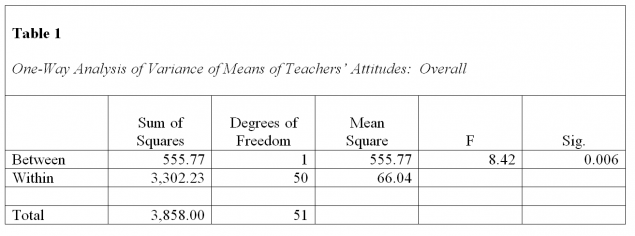
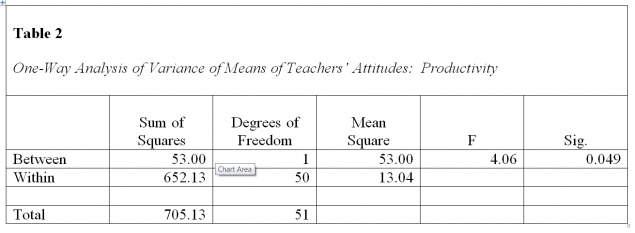
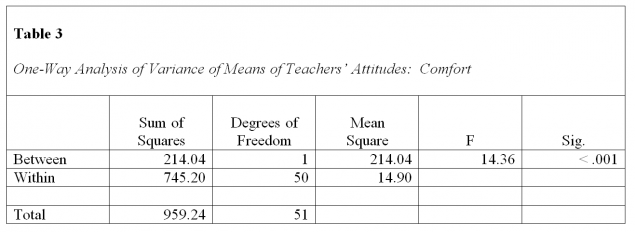



 Jan Ray, an Associate Professor of Education at the University of Hawaiʻi at Hilo, holds a B.S. in Education, an M.A. in Curriculum and Instruction, and an Ed.D. in Technology and Learning. She currently teaches educational technology, educational psychology, learner development, and diverse learners in the classroom courses. Her research interests include distance learning, social media, teaching effectiveness, and school learning gardens.
Jan Ray, an Associate Professor of Education at the University of Hawaiʻi at Hilo, holds a B.S. in Education, an M.A. in Curriculum and Instruction, and an Ed.D. in Technology and Learning. She currently teaches educational technology, educational psychology, learner development, and diverse learners in the classroom courses. Her research interests include distance learning, social media, teaching effectiveness, and school learning gardens.  Koh Ming Wei holds a Ph.D. in Sustainability Education, and has been farming and homesteading since the 1990s. Ming Wei has created the Pedagogy of Food to frame the kind of education she believes in and shares. Her research includes how the school learning garden is a conducive context and experience to teach core subjects, STEM, and foundational life skills.
Koh Ming Wei holds a Ph.D. in Sustainability Education, and has been farming and homesteading since the 1990s. Ming Wei has created the Pedagogy of Food to frame the kind of education she believes in and shares. Her research includes how the school learning garden is a conducive context and experience to teach core subjects, STEM, and foundational life skills.  Diane Barrett, an Associate Professor of Education at the University of Hawaiʻi at Hilo, holds a master’s degree in pure mathematics and a doctoral degree in math education. She currently teaches math and science education, as well as provides professional development for K-12 teachers in mathematics aligned with the Common Core State Standards. Her areas of research include inquiry in the math and science classroom, pedagogical content knowledge, assessment, and the impact of teacher collaboration on student learning.
Diane Barrett, an Associate Professor of Education at the University of Hawaiʻi at Hilo, holds a master’s degree in pure mathematics and a doctoral degree in math education. She currently teaches math and science education, as well as provides professional development for K-12 teachers in mathematics aligned with the Common Core State Standards. Her areas of research include inquiry in the math and science classroom, pedagogical content knowledge, assessment, and the impact of teacher collaboration on student learning. 
